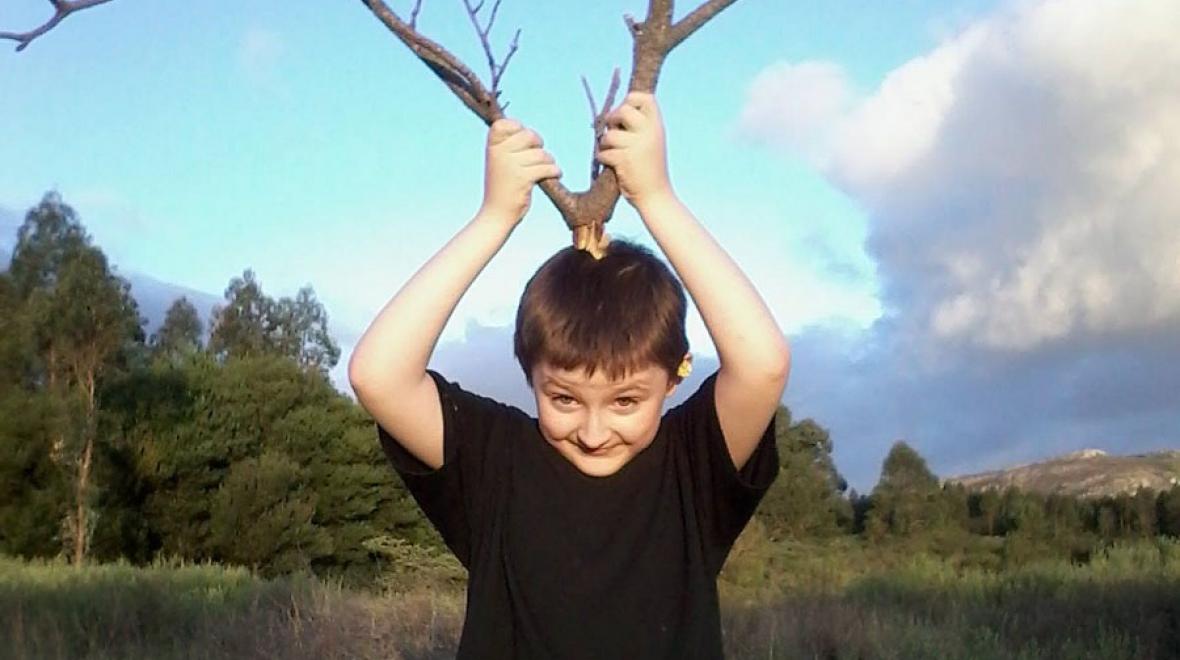
Photo:
The author's son, Duncan. Photo credit: Grace Alexander
It’s a beautiful day to be at the park. The sun is shining, and my son Duncan is playing soccer with a classmate when the other mom leans in close and makes her comment in a hushed voice.
“I was so sorry to hear Duncan is autistic. It must be incredibly hard for you! I know kids with autism, like, lack empathy and all that stuff? I don’t know how you manage.”
She pats my arm and turns away to quiet her crying toddler. Across the park, the ball flies into the net and both boys whoop with glee. I bite my tongue until it bleeds, reminding myself that getting angry solves nothing, no matter how insulting her assumptions are.
My son doesn’t lack empathy; on the contrary, he feels so much empathy it hurts.
Duncan was barely 5 when profound speech delay, poor muscle tone, sensitivity to tastes and textures, and difficulty transitioning between tasks all added up to a diagnosis of Autism Spectrum Disorder (ASD).
“Your son has an IQ two points shy of genius level,” the neuropsychologist told me. “He also has the coping skills of a 12-year-old. He presents so closely to neurotypical that people will initially see him as merely quirky… but when his carefully maintained self-control slips, he’ll be in danger of being labeled as 'a problem child.'"
“Duncan needs occupational therapy, physical therapy, social skills classes and speech therapy, but I’m going to tell you right now they are going to deny him the first three because his tests will come back as not impaired enough.” The doctor looks at Duncan, who is lying on the couch with his head hanging off the seat, making animal noises, then back at me. “You will have to be Duncan’s strongest advocate,” he says.
The doctor was right. After futile battles with the insurance company, Duncan was finally approved for sporadic, half-hour sessions with a speech pathologist. Nothing more. With the word “advocate” ringing in my ears, I threw myself into figuring the rest of it out on my own.
I sought out other moms in the same boat, and we discussed ADHD meds and hand strengthening exercises. I put Duncan in taekwondo to improve his balance and coordination and developed healthy meals he would actually eat. Finally, I turned my attention to his social skills — specifically, teacher comments about his anxiety, which spiked sharply when a classmate was upset or unhappy.
My son doesn’t lack empathy; on the contrary, he feels so much empathy it hurts.
Children with ASD were formerly thought to be unable to feel empathy, but multiple studies have shown this not to be the case. Duncan’s problem wasn’t that he didn’t understand how to empathize – emotionally, his empathy was off the charts. The problem was that, cognitively, he didn’t know what to do with all of that emotion.
If another child got hurt, Duncan’s response was to curl up in a ball with his hands over his ears and his eyes shut, shaking. If a classmate was crying because they got in trouble, Duncan would stand awkwardly off to the side, then try to create a distraction. His go-to request as he grew older was “Can we stop talking about this?” not because he didn’t care, but because he couldn’t handle the depth of his caring.
In other words, Duncan’s own personal distress at seeing pain or unhappiness outweighed his ability to act on his empathic concern. The cost of empathy (which required further exposing himself to the upsetting situation) was judged by his brain to be too high, so he disengaged.
We worked hard on how Duncan related to other people, comparing his classmate’s experiences to his own and talking about what Duncan would wish for if he were sad, mad, or hurt.
It paid off. I started getting notes from his teachers, decorated with hearts and smiley faces, tucked into his folder behind his math homework. “Duncan saw J----- get sad today when a block castle fell down,” one read. “He gave him more blocks, and helped him build a new castle. This is amazing progress.”
“Today Duncan came and told me he would be B-----'s special friend today, and help her not get in trouble,” another began. “B----- has been sent to the principal’s office every day this week… until today. Yay Duncan!”
“A----- fell down on the playground today and scraped his knee,” a third recounted. “Duncan went quickly to A-----, helped him up, and led him to me. It’s the first time I’ve ever seen Duncan run towards a crying child and not away. I’m so proud of him.”
Now, five years from his initial diagnosis, I watch Duncan race towards me from the far end of the park. He skids to a stop, throws his arms around my neck, and says, “Mom! I love you! Thanks for bringing me to the park! Can I have a cookie?”
The other mom’s toddler is crying again, and Duncan crouches down and pats his hair. “Hey, little guy. Don’t cry! Mom, can he have one of my cookies? Hey, G-----'s mom, can your baby have a cookie?” The other mom goggles at my brilliant, unique, caring and kind son. I smile sunnily at her and hand Duncan two cookies.
Kids with autism lack empathy, my ass.











